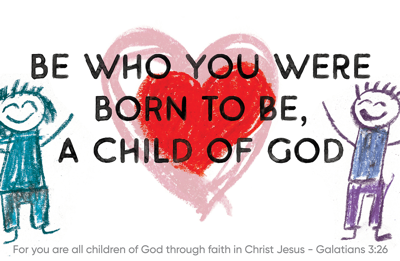Be who were born to be, a child of God

 What would your ideal parent be like? This question may feel a bit awkward or even painful to answer, but I invite you to consider it for a moment. If you’re anything like me, your character list of the ideal parent might go something like… caring, gentle, wise, compassionate, capable, stable, fun. Then, if I was really going all out with a wish list I might add powerful, rich and well respected. (more…)
What would your ideal parent be like? This question may feel a bit awkward or even painful to answer, but I invite you to consider it for a moment. If you’re anything like me, your character list of the ideal parent might go something like… caring, gentle, wise, compassionate, capable, stable, fun. Then, if I was really going all out with a wish list I might add powerful, rich and well respected. (more…)
Leading children

 According to the Australian Royal Commission into Institutional Responses to Child Sexual Abuse, institutional child sexual abuse has been occurring for generations. Many spoke of having their innocence stolen, their childhood lost, their education and prospective career taken from them and their personal relationships damaged. For many, sexual abuse is a trauma they can never escape. It can affect every aspect of their lives. The Commission found that society’s values and mechanisms which were available to regulate and control aberrant behavior failed.
According to the Australian Royal Commission into Institutional Responses to Child Sexual Abuse, institutional child sexual abuse has been occurring for generations. Many spoke of having their innocence stolen, their childhood lost, their education and prospective career taken from them and their personal relationships damaged. For many, sexual abuse is a trauma they can never escape. It can affect every aspect of their lives. The Commission found that society’s values and mechanisms which were available to regulate and control aberrant behavior failed.
Because children are vulnerable to abuse, protecting them and promoting their safety is important. We want to keep children safe and ensure their well-being. As a result of the Commission, those leading children must pass a “Working with Children Check”.
We can lead children in the family, in recreational activities and in educational activities. This is a privilege and a responsibility.
Watch your power
Those leading children have positional power, spiritual power and worldview power. Because leaders are responsible for the child’s safety and welfare, these powers need to be respected and controlled.
Teachers and parents have positional power over children. And because of their size and maturity, adults always have power over children. Such leaders have authority because of their position with respect to children which must be exercised with care because children are vulnerable. Misuse of positional power can cause emotional harm to children.
Those leading children can have spiritual power, Their view of God, prayer and the Bible may be evident to the children. Do we give these priority or are they only considered in times of need? Are our spiritual attitudes legalistic, liberal or reasonable? Misuse of this power can cause spiritual harm to children.
I’m doing a course on worldviews like theism, deism, naturalism, nihilism, existentialism, pantheism, new age, and postmodernism (Sire, 2009). Clearly, everyone has a worldview. Did you know that we can influence the worldview of others, particularly children?
Those leading children influence their worldview. This includes beliefs about God, the universe, humanity, history and morality. Our beliefs and attitudes about these can be contagious. This is important because a child’s mind is receptive and their response to the Bible’s message of salvation can determine their eternal destiny.
But did you know that we can learn lessons from children?
Imitate their trust and humility
Jesus said, “anyone who will not receive the kingdom of God like a little child will never enter it” (Mk. 10:15; Lk. 18:17NIV). Little children have unwavering trust in their carers. That’s the kind of faith God wants us to have in Him and the message He has given us in the Bible, Let’s cultivate a constant trust in the God of the Bible who created the universe and all that is in it and who provided Jesus to be the source of our eternal life.
Little children are also humble (Mt. 18:1-4). They are totally dependent on others, particularly their parents. And they imitate their parents. Although little children can be selfish, they don’t have much to be proud about. Jesus said, “anyone who becomes as humble as this little child is the greatest in the Kingdom of Heaven” (Mt. 18:4NLT). And humility is one of the steps of repentance (Jas. 4:6-10). Acknowledging our sinfulness and relying on the God’s spiritual power through Jesus rather than always being self-reliant is an act of humility.
Lessons for us
Let’s respect the privilege and responsibility of leading children by serving them like Jesus served His generation. This includes respecting our positional authority, spiritual power and worldview influence. And imitating their continual faith and humility.
Reference
Sire J W (2009) “The universe next door – A basic Worldview Catalogue”, Intervarsity Press.
Written, March 2018
Who is accountable to God?

 Children grow up from infancy, to childhood, to adolescence and then to adulthood. At the beginning they are totally dependent on their parents and are not held accountable for their behavior. But as they grow up, they are trained to be responsible and accountable. The Bible teaches that everyone is answerable to God (Mt. 12:36-37; Rom. 3:19; Heb. 9:27). But when are children accountable to God?
Children grow up from infancy, to childhood, to adolescence and then to adulthood. At the beginning they are totally dependent on their parents and are not held accountable for their behavior. But as they grow up, they are trained to be responsible and accountable. The Bible teaches that everyone is answerable to God (Mt. 12:36-37; Rom. 3:19; Heb. 9:27). But when are children accountable to God?
The Bible says that both Christians and non-Christians are accountable to God. At the end of their lives, Christians “must all appear before the judgment seat of Christ” (2 Cor. 5:10NIV) when “each of us will give an account of ourselves to God” (Rom. 14:12). This is used to determine their rewards in heaven (1 Cor. 3:12-15). Non-Christians are “judged according to what they had done” at the “great white throne” (Rev. 20:11-15). This is used to determine their punishment in hell.
Is this fair? God has revealed Himself to everyone in at least two ways. First the natural world demands a Creator – complicated things, like animals and plants and people, don’t make themselves (Rom. 1:19-20). Second, we all have a conscience and so can know instinctively what is right and wrong and feel guilty when we do wrong (Rom. 2:14-15). If someone hasn’t heard about how God revealed Himself in history (in the Bible), then they are judged according to their response to these more general revelations of God. So God is fair and “people are without excuse” (Rom. 1:20).
Non-accountable
The Bible teaches that we are sinful from birth (Gen. 8:21; Ps. 51:5; 58:3). We are all sinners (Rom. 3:10, 23). So children are never innocent in the sense of being sinless. This is serious because spiritual death leads to eternal separation from God (Jn. 3:16; Rom 6:23).
The Bible also teaches that because they do not yet know the difference between right and wrong or good and evil, infants are not accountable for their sin (Dt. 1:39; Num. 14:31; Isa. 7:14-16; Jon. 4:11). They are not yet aware of their sinful condition or God’s cure.
So very young children are not accountable for their sin. Their minds are not developed well enough to understand that things don’t make themselves or to feel guilty when they do wrong. But what about when they grow past this stage of life?
Accountable
The Bible makes two types of statements about the sins of parents and children. First, with regard to the commandment given to the Israelites against idolatry, “You shall not bow down to them or worship them; for I, the Lord your God, am a jealous God, punishing the children for the sin of the parents to the third and fourth generation of those who hate me” (Ex. 20:5; 34:7; Num. 14:18; Dt. 5:9). As they lived in households that extended to three or four generations, this means that the temporal judgment for their rebellion against God was on themselves and their households. The Bible gives examples of households that experienced the consequence of God’s judgment of the sins of their patriarch (Num. 16:31-35; Josh. 7:24-25). Likewise, today the consequences of a parent’s behavior can impact others in their household.
When the Jews used this statement to say that they were suffering for their ancestors’ sins, Ezekiel corrected them writing “The one who sins is the one who will die” (Ezek. 18:4, 20). This is an example of the second type of statement, which relates to the death penalty. “Parents are not to be put to death for their children, nor children put to death for their parents; each will die for their own sin” (Dt. 24:16; 2 Ki. 14:6; 2 Chron. 25:4). So in the Israelite legal system, a penalty was to be imposed only on those who committed the crime, and not on those who were innocent. This meant that after children reached the age when they knew the difference between right and wrong, they were accountable for their behavior. Likewise, today when children are old enough to respond to their conscience they are responsible to God for their own behavior.
Conclusion
So the statement that everyone is accountable to God doesn’t apply to young children or those whose minds are not developed well enough to understand that things don’t make themselves or to feel guilty when they do wrong.
But those who have grown past this stage of life and can understand these things are accountable to God. They have no excuse. That’s why it’s important to know that our sinful ways separate us from God, but Jesus died to take the punishment that we deserve (which is hell) and reconcile us to God. We need to take responsibility for our behavior and confess our sins, because God cannot forgive our sin until it is confessed.
Written, May 2014






RECENT COMMENTS